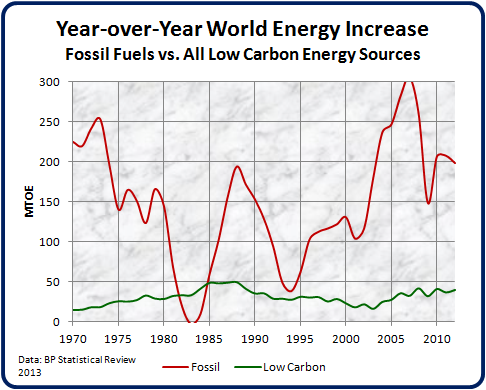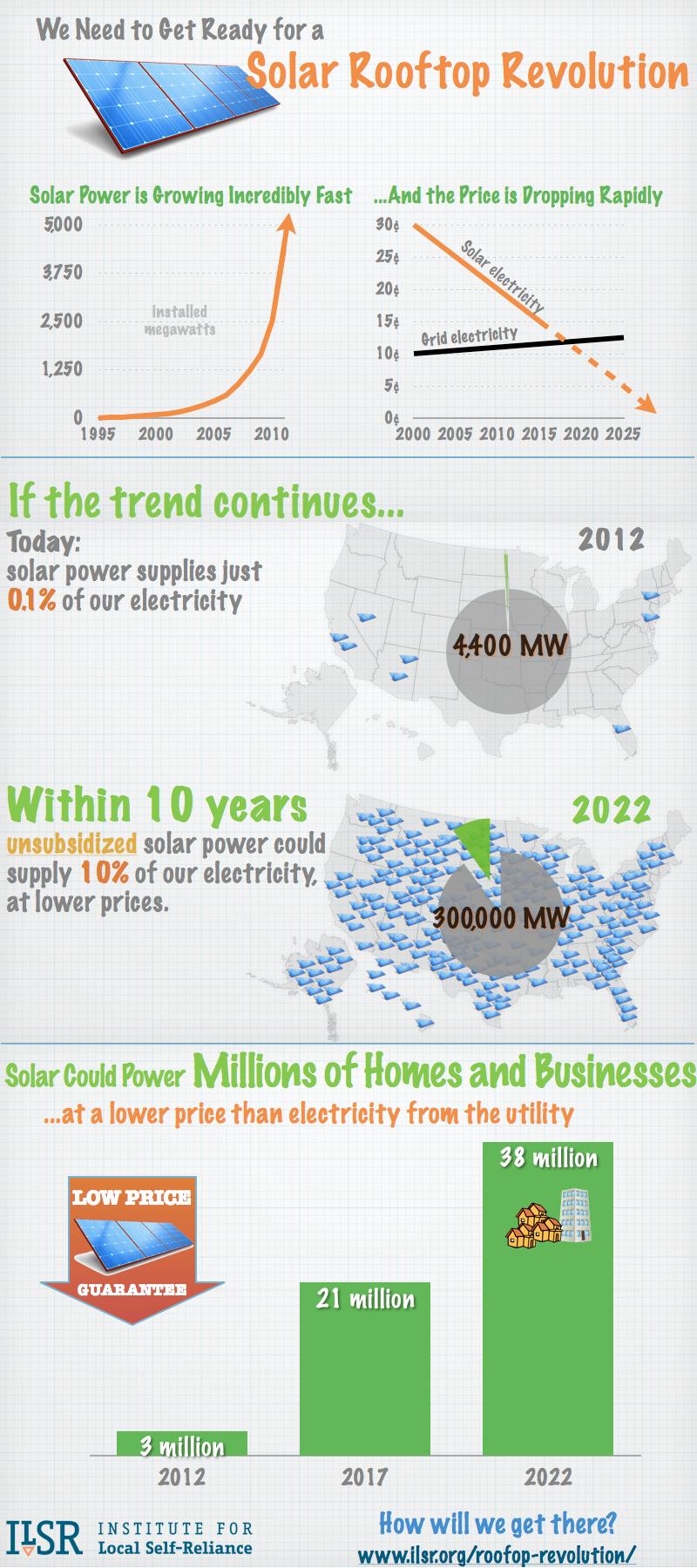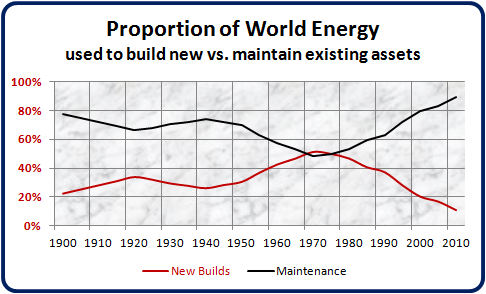Environment & Energy
Related: About this forumCoal remains world's fastest growing *fossil fuel*: BP review
Coal remained the world's fastest-growing fossil fuel in 2012, despite the rate of consumption slipping below the 10-year average of 4.4% during the year, according to the BP 2013 Statistical Review of World Energy released Wednesday.
Total global coal consumption in 2012 rose 2.5% on the year...
Since solar and wind are both growing at a far, far, far, far far faster rate than coal, it would be completely untrue to say that coal is the fastest growing energy source.
muriel_volestrangler
(101,321 posts)Coal: 2011: 3628.79 MTOE; 2012: 3730.09 MTOE = +101.3
All renewables: 2011 205.57 MTOE; 2012: 237.42 MTOE = +31.85
kristopher
(29,798 posts)Since you are aware of that I'm wondering where you were when the misleading headline was posted elsewhere. The accurate rendering of the information drives you to this clarification yet a blatantly untrue post elicits nothing?
Odd set of values.
muriel_volestrangler
(101,321 posts)Use of coal grew by 101 MTOE; renewables by 32 MTOE. If it's any consolation to you, nuclear fell from 600.37 to 560.39.
Since energy usage isn't a quantity that depends on its previous amount (unlike, say, populations), the actual increase or decrease is probably a more useful metric. If we are, say, comparing the votes for candidates in an election, we typically say "the Dems got 56% this time, compared with 49% last time - up 7%", rather than "they increased their vote by 14.3%". Or we say "Wind Topped All New US Generation Capacity in 2012, Ahead of Gas and Coal", and compare the absolute new capacity between the energy types, not how much they grew relative to last year's capacity.
I didn't see the other post on this subject until I'd posted in your thread. Maybe it was the asterisks in your title - who knows?
kristopher
(29,798 posts)Growing means to become larger. The /er/ in larger implies a comparison to the previous state.
You will never find the term 'fastest growing' used in reference to absolute growth when comparing a range of competing options. The original article used the term as I've explained and it also used the headline that leads this thread.
If you wish to make a point that the percentage rate of growth is masking the relative size of the samples that is certainly valid, but that isn't a discussion of rate of growth, the pretense that the two are interchangeable is not defensible.
The other thread and your obfuscation are both dishonest. I really expected better of you. My bad, it won't happen again.
muriel_volestrangler
(101,321 posts)'Dishonest'? You used the measure of absolute growth yourself . That was why I linked to your post. You shouldn't resort to cheap insults just because someone's pointed out something you hadn't thought of.
http://xkcd.com/1102/
The religion whose absolute number of adherents is growing the fastest.
The religion that is growing fastest in terms of percentage growth per year.
The religion that is gaining the greatest number of converts in the world.
https://en.wikipedia.org/wiki/Claims_to_be_the_fastest-growing_religion
Those are the first 2 results I found with Google for "fastest growing". If you haven't considered whether absolute growth may be a more appropriate figure to examine, then you haven't thought about it much.
kristopher
(29,798 posts)The link to the wind article contains nothing like the terms used in the OP. Instead it clearly states the metric like this, "With its record year, U.S. wind became the first renewable energy to lead the nation in annual new generation capacity, ahead of traditional electricity sources like natural gas, coal and nuclear".
In short, that simply does not support your claim.
And then you resort to using a wiki entry about competing claims from religions? I suppose it didn't occur to you that those who are intent on promoting their religion are renowned for their lack of critical thinking skills? Do you honestly think that the same people who perverted the very word "truth" itself is are the source to look to for perspective on accurate use of language?
I do not.
It isn't that I don't like debate, I actually love exploration of ideas through both collaborative and oppositional discussion. What I despise though, is dishonest debate.
Let's take another couple of examples.
If someone says "the fastest growing city" what does that mean?
If someone says "the fastest growing stock" what does that mean?
If someone says "the fastest growing companies" what does that mean?
It refers to rate of growth.
muriel_volestrangler
(101,321 posts)I am not being dishonest. You are being insulting, though.
I used wikipedia as an example about how most people know that 'fastest growing' can refer to absolute growth. Wikipedia is written by normal internet posters, not specifically religious people.
Yes, your post from a few months ago does support my position: it shows that you use figures that compare the absolute amounts by which generation capacity grows. This is about the amount generated - which is closely allied.
If you want another example of a DUer, in E&E, using the absolute amounts, try this, from less than 12 hours ago:
http://www.democraticunderground.com/112746861
Notice that GliderGuider has constructed a chart of yearly increases of energy use, by energy type. Exactly what we're talking about in this thread.
What surprises me is that you seem so keen to cover up the continuing environmental problem, which is that we're using more energy, and getting most of it from fossil fuels. Saying "but there's a lot more renewables compared with last year" is ignoring the problem - increasing carbon emissions - and your desperation to not talk about it looks pretty awful. When there is some good news, such as your OP about US wind leading coal and all other fossil fuel sources in new generation, we see a good thing happening.
You shouldn't hide your head in the sand by resorting to 'but there's so much more renewables compared to the year before!". A Polyanna-ish approach doesn't help us much. An increase in wind, or solar, is not caused by there being a lot of them already there. It's not 'organic growth'. The problem we have is that we use fossil fuels. If we used 100 times the amount of renewables that we do now, but still carried on using more fossil fuels, we'd still have just as big a problem as now.
kristopher
(29,798 posts)Growing means to become larger. The /er/ in larger implies a comparison to the previous state.
You will never find the term 'fastest growing' used in reference to absolute growth when comparing a range of competing options. The original article used the term as I've explained and it also used the headline that leads this thread.
If you wish to make a point that the percentage rate of growth is masking the relative size of the samples that is certainly valid, but that isn't a discussion of rate of growth, the pretense that the two are interchangeable is not defensible.
The other thread and your obfuscation are both dishonest. I really expected better of you. My bad, it won't happen again.
Pretty hard to make the case that I'm somehow against comparing absolute growth in the light if that, isn't it? It is the disingenuous use of "fastest growing" since that term refers to a comparison of rate of growth. I gave you three examples that are analogous to energy sources, can you envision any of those ever being used to refer to absolute growth? It's like saying that a 300lb person who puts on 30 pounds in 6 months is "growing faster" than a 20 pound infant who put on 20 in 6 months. You can say it, but the information value of "growing faster" in that context is less than nil since it communicates an inaccurate perception in the mind of the listener/reader.
muriel_volestrangler
(101,321 posts)The ability of an organism to put on weight depends heavily on its current weight.
Never mind - you started this thread because you objected to the title of another one, and, rather than posting in it to make your point, you had to start a new one. Unsurprisingly, everyone has ignored your unnecessary extra thread, because your point is highly arguable, but trivial, and you didn't actually start it wanting a conversation except with anyone who agrees with you 100%.
Maybe everyone else knew you'd just end up insulting them if they talked to you.
oldhippie
(3,249 posts)"Maybe everyone else knew you'd just end up insulting them if they talked to you."
kristopher
(29,798 posts)...then don't argue dishonestly.
Which your latest post is another example of:
"Again, you are talking, literally, about organic growth. The ability of an organism to put on weight depends heavily on its current weight."
No, I'm talking about common usage in the English language and the misuse of terms to create false impressions. As I said, it is perfectly valid to discuss the growth of a generating source in absolute terms, if that is the point. But saying that coal is the fastest growing source of energy is just as flawed as the 4 other examples I've offered.
GliderGuider
(21,088 posts)Absolute numbers are most appropriate because the atmosphere has a finite mass. The crucial, fundamental thing we're talking about here is not the rate of increase of energy production, but the absolute amount of CO2 that is being released relative to the mass of the atmosphere. If that absolute amount keeps going up, then we have an existential problem. This bald fact doesn't support kristopher's narrative, so he dismisses it, and tries to spin the argument in a different direction.
Here's a comparison of the absolute performance of fossil fuels (coal, oil and gas) and all other low carbon sources (renewables, hydro and nuclear) over the past 43 years. To make the graph a bit easier to read the data has been smoothed by applying a five year trailing average.

As you can see, the addition of low-carbon energy to the mix has never exceeded 50 MTOE per year (over a 5-year average). As we should expect, the growth in fossil fuels have been more volatile. You can see how FF growth responds to oil embargoes and economic recessions on the downside, and economic rebound on the upside, but its growth has consistently remained much higher. The average annual addition of fossil energy over the last years has been 252 MTOE per year. In contrast, all low-carbon sources have added only 36 MTOE per year, just 14% of that amount.
Because of the finite mass of the atmosphere and how close we are to complete climate destabilization, absolute numbers matter much more at this point than percentages. The use of percentages in this argument amounts to pounding the table. (As per the old lawyer's saying: "If the facts are in your favor, pound the facts. If the facts are not in your favor pound the law. If neither the facts nor the law are in your favor, pound the table."![]()
kristopher
(29,798 posts)It isn't 'disguised' as a factoid about which energy source is the fastest growing (as the OP in the other thread was) in order to serve the other poster's (not MV) agenda of disparaging the potential of renewables.
Your belief that absolute numbers matter more than percentages is, pardon the expression, simply dumb. And if you are saying that we have no need to evaluate the merits and the potential for deployment of the alternatives because we should give up it is even dumber.
NickB79
(19,248 posts)If one assumes we have another 50 years or so for renewable production to get up to and eventually surpass that of fossil fuels.
Unfortunately:

kristopher
(29,798 posts)I haven't.
Save your red herring for a hearty meal.
ETA:

NickB79
(19,248 posts)Too bad that what we needed was 10% solar by 1992 to save our asses from catastrophic climate change.
I'll point out that we'll almost certainly have 0% summer ice coverage in the Arctic by then though, and the current crazy weather we're seeing now from a shifting jet stream will be remembered fondly as "good times".
GliderGuider
(21,088 posts)It takes some of our current energy to maintain the cumulative asset base that resulted from previous energy use. Only the portion of our current energy production that's not used for maintenance can be used to fuel further growth.
If we wish to maintain the structure of civilization, then energy use must continue to grow over time. If it does not keep growing we end up in a catabolic situation, in which growth ceases and the existing asset base begins to erode.
Tim Garrett at the University of Utah has done some preliminary research on this, and has concluded that it takes ~10 mw of today's power to support each 1990 dollar's worth of cumulative assets.
Based on Garrett's analysis, here is the situation since 1900. The graph shows the amount of energy spent on maintaining the existing asset base (based on the estimated cumulative GWP since Year 1 in constant 1990 dollars, at Garret's calculated rate of 9.7 mw/$), and its reciprocal: the amount of energy that's left over to use in the growth of civilization. Notice that the "growth energy" has been falling since 1970.

If this assessment is correct, we risk falling into catabolic collapse before 2030 unless we can drastically increase the amount of energy we can generate. Energy efficiency increases of a few percent aren't going to be enough.
One final note: Despite all the publicity given to the idea, energy efficiency improvements alone cannot, over the long run, decrease energy use. That's because efficiency improvements simply increase the amount of work that can be performed by the same energy. As that work is translated into money, civilization keeps expanding. It's the Jevons Paradox operating at the level of our entire civilization.
http://www.paulchefurka.ca/Looking.html
GliderGuider
(21,088 posts)Again, using BP data, the annual global increases in MTOE for each low carbon source, smoothed with a 5-year trailing average.

The message of the data is obvious - since 2002 or so, hydro and other renewables have been replacing nuclear power. They have not been replacing fossil fuels on a global level. As you can see from the next graph, the only things that have put a kink in the use of fossil fuel have been the fallout of the Iran-Iraq war and the 2008 recession.

We should probably work as hard as we can on two things over the next 10 years:
1. Developing low-carbon energy sources.
2. Slowing/stopping/reversing the growth of the global economy.